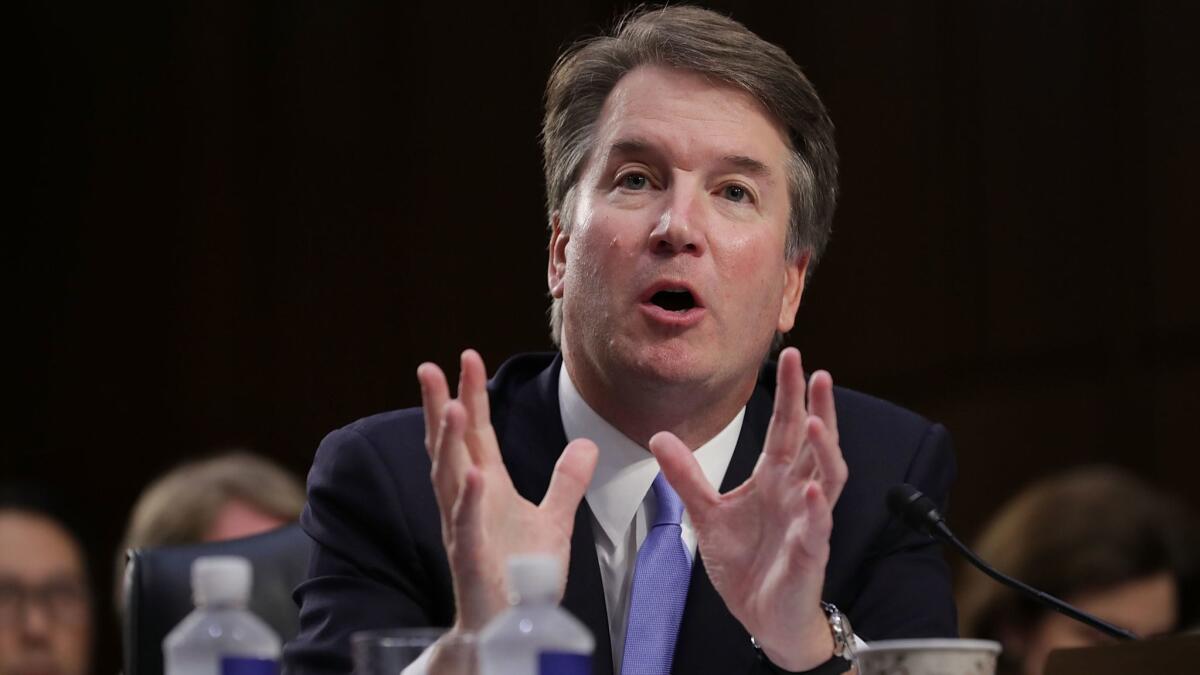Newsletter: We’ve broken the Supreme Court

Good morning. I’m Paul Thornton, and it is Saturday, Sept. 8, 2018. None of what you will read below was written anonymously. Let’s take a look back at the week in Opinion.
The news this week was dominated by the implosion of the Trump White House, first reported in excerpts from legendary reporter Bob Woodward’s new book “Fear,” then in an explosive New York Times op-ed article written by an unnamed administration official who tried to reassure the American people that despite all appearances to the contrary, a “resistance” within the White House was serving as a check on the president’s worst instincts. (Nothing calms voters more than knowing a cabal of unelected bureaucrats is secretly undermining the duly elected president. What a time to be alive.)
All of this distracts from the machinery of government actually at work in a very consequential way — that is, the Senate Judiciary Committee holding hearings for Supreme Court nominee Brett Kavanaugh, whose confirmation on the slimmest of party-line votes is all but assured. Kavanaugh’s ascendance to the highest court in the land will be celebrated as a great victory for the president, but in any other time a process rife with polarization and questionable procedures would be regretful. According to The Times Editorial Board, this shows our process for selecting Supreme Court justices may be broken:
Regardless of how we got here, the fact is that judicial confirmations — especially for the Supreme Court — have become alarmingly more partisan in recent years.
[Anthony] Kennedy was confirmed by a vote of 97 to 0 in 1988. Justice Ruth Bader Ginsburg was confirmed 96 to 3 in 1993. Flash forward to 2005, when John G. Roberts, like Kavanaugh a federal appeals court judge rated “well qualified” by the American Bar Assn., was confirmed 78 to 22, with half of Democratic senators voting against him. Partisan polarization in voting became even more pronounced in subsequent nominations. Forty Democratic senators voted against President George W. Bush’s nomination of Samuel A. Alito Jr. in 2006. More than 30 Republican senators voted against Obama’s two nominees, Sonia Sotomayor and Elena Kagan.
Ginsburg expressed the hope this year that “one fine day, Congress will return to the bipartisan spirit that prevailed for my nomination.” That also has been our position. We long have argued that, even though presidents can be expected to nominate justices who share their general approach to the law, the Senate in considering those nominees should place the emphasis on legal qualifications and judicial temperament. In that way, the court can remain above politics even if individual justices bring different philosophies to the bench as the White House changes hands....
The question isn’t whether the selection of Supreme Court justices should be rescued from excessive partisanship; it’s how that might be accomplished. Although in the past we have supported abolition of the filibuster, restoring it for Supreme Court nominations might be a way to encourage bipartisan consensus and to prod presidents to nominate broadly acceptable candidates. It’s also worth considering whether Supreme Court justices should be appointed not for life but for lengthy fixed terms, which would lower the political stakes in any individual appointment and discourage justices from hanging on to office in the hopes of being able to retire when a president of the same party is elected.
Kavanaugh seems certain to join the pinnacle of the American legal profession, but it will be an achievement tainted by acrimony and accusations of unfairness. There must be a better way.
That old “judges as umpires” saw: Kavanaugh brought it back, but it needs to go away for good, says UC Berkeley School of Law Dean Erwin Chemerinsky. The idea that a judge can be some completely neutral arbiter, free of the bias that comes with being human, is belied by the fact that Supreme Court justices so often disagree on basic questions of the law (which is why we have nine of them and not, say, one). L.A. Times
What would Thurgood Marshall say to “originalists” like Kavanaugh? The late jurist — and the Supreme Court’s first black justice — held the Constitution and the framers in much lower regard than his colleagues who revered it enough to believe it ought to be applied as originally written. “The true miracle was not the birth of the Constitution,” Marshall said in 1987, “but its life, a life nurtured through two turbulent centuries of our own making, and a life embodying much good fortune that was not.” L.A. Times
Won’t you take me to Crazytown? Even by our depressing standards today, this past week in the Trump White House was probably its most chaotic, says The Times Editorial Board. Some of this might be just noise, and perhaps too many of Trump’s critics feel some schadenfreude, but the board has a warning: “The president is a profoundly powerful man, the commander in chief of an enormous war-fighting force and an executive capable of unilaterally reversing the nation’s efforts to combat climate change or provide healthcare to its citizens.” L.A. Times
About that op-ed: The anonymous piece in the New York Times from an administration official largely confirmed what we already knew about the Trump White House, writes Scott Martelle. Separately, Jessica Roy says resisting the president in private while supporting the president in public makes the op-ed writer a coward, not a brave patriot.
Would Albert Einstein have been hired at UCLA today? He may have come up with the theory of relativity and formed much of our understanding of the universe, but his stated commitment to diversity and inclusion may have been insufficient for UCLA’s PC police, writes Heather Mac Donald. She continues: “Reality check: UCLA and the University of California are among the most tolerant, welcoming environments in human history for all races, ethnicities and genders.” L.A. Times
Reach me: paul.thornton@latimes.com
